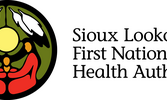SLFNHA responds to the CMA’s ‘Apology to Indigenous Peoples’
Tim Brody - Editor
Sioux Lookout First Nations Health Authority (SLFNHA) is calling for, “concrete actions and systemic change” following an apology on Sept. 18 from the Canadian Medical Association (CMA) “for its role and the role of the medical profession in past and ongoing harm to First Nations, Inuit, and Métis Peoples in the health system.”
“We have not lived up to the ethical standards the medical profession is expected to uphold to ensure the highest standard of care is provided to patients and trust is fostered in physicians, residents and medical students. We realize we have left Indigenous Peoples out of that high standard of care, stated Dr. Joss Reimer, CMA president, in the apology.
“SLFNHA acknowledges the recent apology made by the CMA regarding the historical and ongoing harms experienced by First Nations Peoples within the healthcare system. While this recognition is an important step, it must be followed by concrete actions and systemic changes. True reconciliation will only be achieved when Indigenous communities have equitable access to quality healthcare and are empowered to lead and shape the services they receive. SLFNHA is committed to transforming healthcare in the north by dismantling barriers, building capacity, and ensuring that the health and wellbeing of First Nations communities are truly prioritized,” stated Sonia Isaac-Mann, President and CEO, SLFNHA, in a Sept. 23 media release.
SLFNHA stated the apology highlights several systemic pitfalls such as racially segregated “Indian Hospitals”, experimental treatment, forced sterilization, and even the withholding of necessary care. The apology also highlights a commitment to reconciliation with a focus on three areas:
• Advancing Indigenous Health
• Supporting Physicians’ Journey to Truth and Reconciliation
• Promoting Internal Reconciliation for CMA Employees and Leadership
The full apology can be found at: https://www.cma.ca/our-focus/indigenous-health/apology-harms-indigenous-peoples.



Respond to this article